What is hierarchy (Taratamya) of Hindu Gods | Who is the real God in Hinduism | Hinduism is monotheism or polytheism | Does Hinduism has many Gods
Namaste friends, how are you doing today? Welcome to #BhagavanBhakthi website / blog.
Bhagavan Lord Sri Vishnu (Krishna) (Rama) blessings to you and your family!
In this website / blog, you will always learn about #Hinduism #Sanskrit language.
Also subscribe to my YouTube channel from this link #BhagavanBhakthi to view videos about #Hinduism #Sanskrit language.
Just before going to “What is hierarchy (Taratamya) of Hindu Gods | Who is the real God in Hinduism | Hinduism is monotheism or polytheism | Does Hinduism has many Gods“, let us know a brief, basic and very important information.
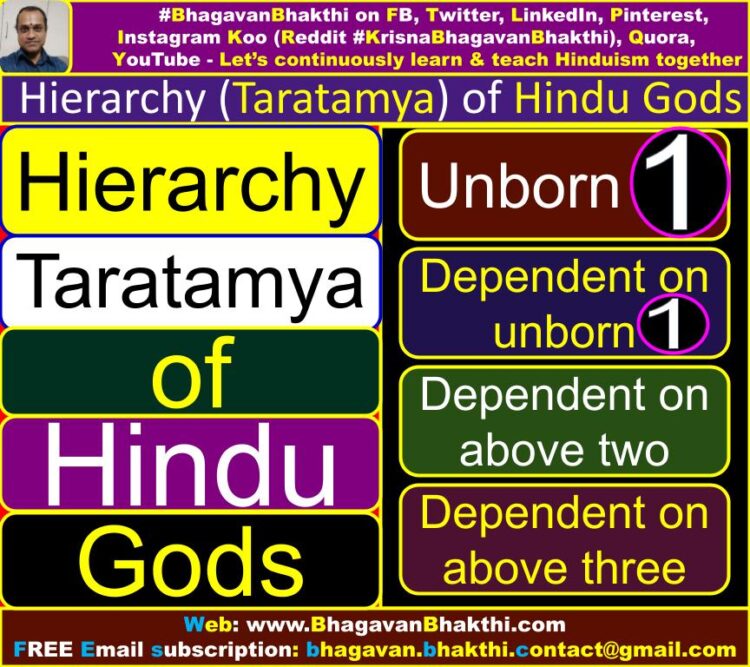
Bhagavan / Parabrahma / God is the one, who is present since the ‘aadi kalam’ (Before grand infinite period).
Also also who is present today and who will be present until the ‘ananta kalam’ (After grand infinite period).
Bhagavan (God) is the one who don’t take birth. He is the one who doesn’t have parents.
Bhagavan (God) is the one who doesn’t depends on anybody and for anything.
Bhagavan (God) is the one who don’t need anything from anybody.
Bhagavan (God) is one who is completely independent of anything or everything or everybody.
Bhagavan (God) should be a “aatma kaama”, means he doesn’t need anybody or anything to satisfy his needs.
AND Bhagavan (God) SOMEONE WHO HAS INFINITE NUMBER OF THESE TYPES OF QUALITIES IS THE REAL BHAGAVAN / ISHWAR / PARABRAHMA / BRAHAMAN / GOD.
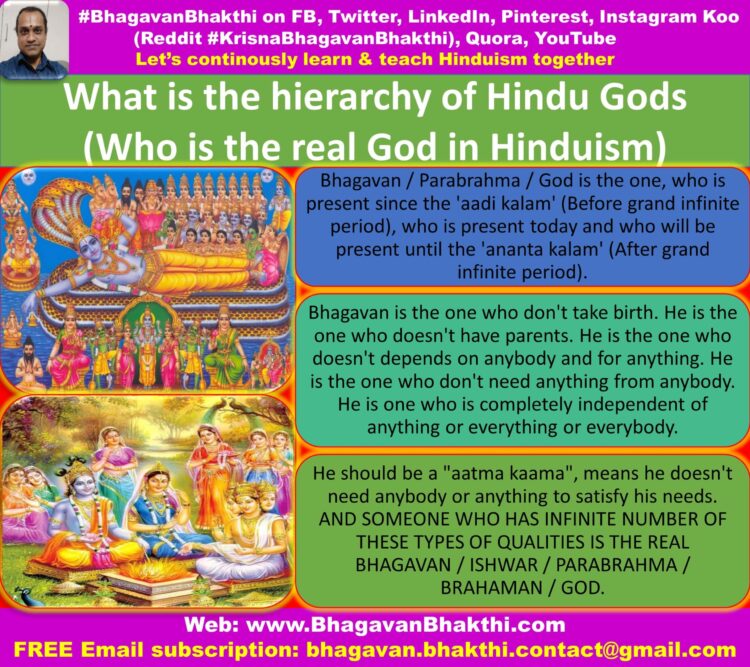
Just before knowing the list of the “what is the hierarchy of Hindu Gods“, let us know some explanation to know in the better way.
To know who is the real God in Hinduism let us consider the first shloka (rik / sukta) of Rigveda as given below:
ॐ || अग्निमीळे पुरोहितं यज्ञस्य देवं ऋत्विजम् | होतारं रत्नधातमम् || 1.001.01 ||
ಓಂ || ಅಗ್ನಿಮೀಳೇ ಪುರೋಹಿತಂ ಯಜ್ಞಸ್ಯ ದೇವಂ ಋತ್ವಿಜಮ್ | ಹೋತಾರಂ ರತ್ನಧಾತಮಮ್ || 1.001.01 ||
ōṁ || agnimīḷē purōhitaṁ yajñasya dēvaṁ r̥tvijam | hōtāraṁ ratnadhātamam || 1.001.01 ||
Here the Devata (Demigod) Lord Agni Deva is praised with 5 attributes as given below:
1. Purohitam (पुरोहितं / ಪುರೋಹಿತಂ / purōhitaṁ)
2. Yajnasya Devam (यज्ञस्य देवं / ಯಜ್ಞಸ್ಯ ದೇವಂ / yajñasya dēvaṁ)
3. Ritvijam (ऋत्विजम् / ಋತ್ವಿಜಮ್ / r̥tvijam)
4. Hotaram (होतारं / ಹೋತಾರಂ / hōtāraṁ)
5. Ratnadhathamam (रत्नधातमम् / ರತ್ನಧಾತಮಮ್ / ratnadhātamam)
Meaning of the above shloka (Rik) from Rigveda is as given below:
1. Purohitam (पुरोहितं / ಪುರೋಹಿತಂ / purōhitaṁ) :
Purohitam means, one who does and wishes only good things to all beings irrespective of anything since the ‘aadi kalam’ (grand unknown time / time immemorial).
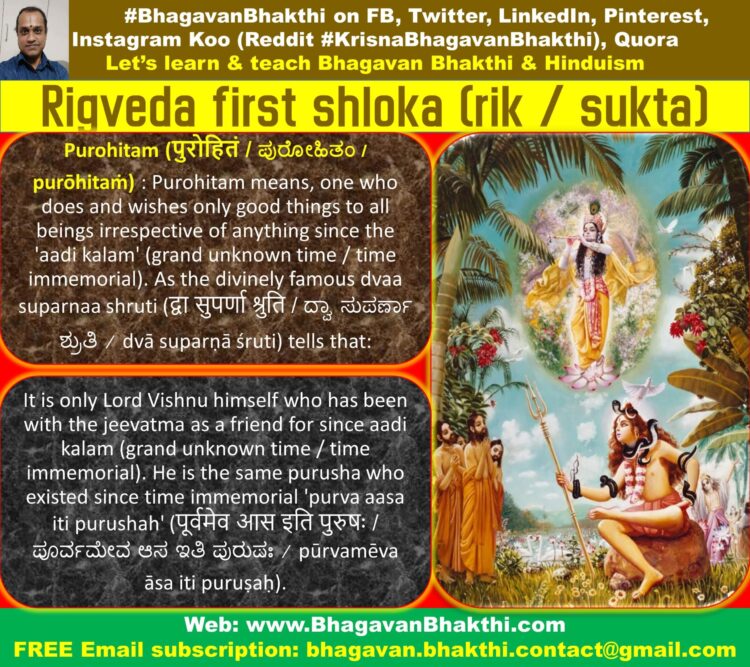
As the divinely famous dvaa suparnaa shruti (द्वा सुपर्णा श्रुति / ದ್ವಾ ಸುಪರ್ಣಾ ಶ್ರುತಿ / dvā suparṇā śruti) tells that:
It is only Lord Vishnu himself who has been with the jeevatma as a friend for since aadi kalam (grand unknown time / time immemorial).
He is the same purusha who existed since time immemorial ‘purva aasa iti purushah’
(पूर्वमेव आस इति पुरुषः / ಪೂರ್ವಮೇವ ಆಸ ಇತಿ ಪುರುಷಃ / pūrvamēva āsa iti puruṣaḥ).
This means, Lord Vishnu is such kind of Supreme Personality (puruṣaḥ), that he is existing since the time immemorial (pūrvamēva).
Thus he is none other than Lord Vishnu (Lord Narayana) himself.
2. Yajnasya Devam (यज्ञस्य देवं / ಯಜ್ಞಸ್ಯ ದೇವಂ / yajñasya dēvaṁ) :
Yajnasya devam, this means the Ishwar (God) who when presented with real devotion, will definitely accepts our pooja (worship).
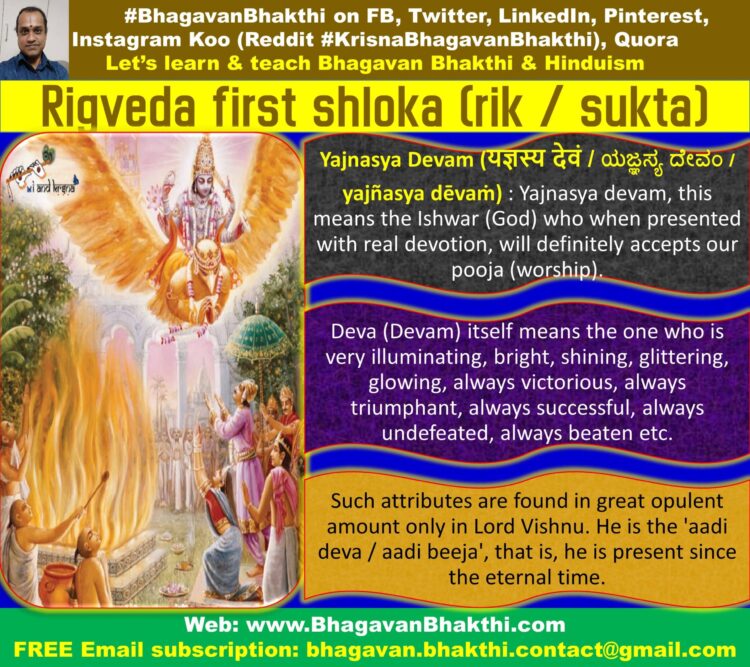
Deva (Devam) itself means the one who is very illuminating, bright, shining, glittering, glowing,
always victorious, always triumphant, always successful, always undefeated, always beaten etc.
Such attributes are found in great opulent amount only in Lord Vishnu.
He is the ‘aadi deva / aadi beeja’, that is, he is present since the eternal time.
3. Ritvijam (ऋत्विजम् / ಋತ್ವಿಜಮ್ / r̥tvijam) :
Usually a Ritvija or Ritvijam is a formal term used for a person who does the yajnam (yajna), e.g., A Poojari (A Purohita).
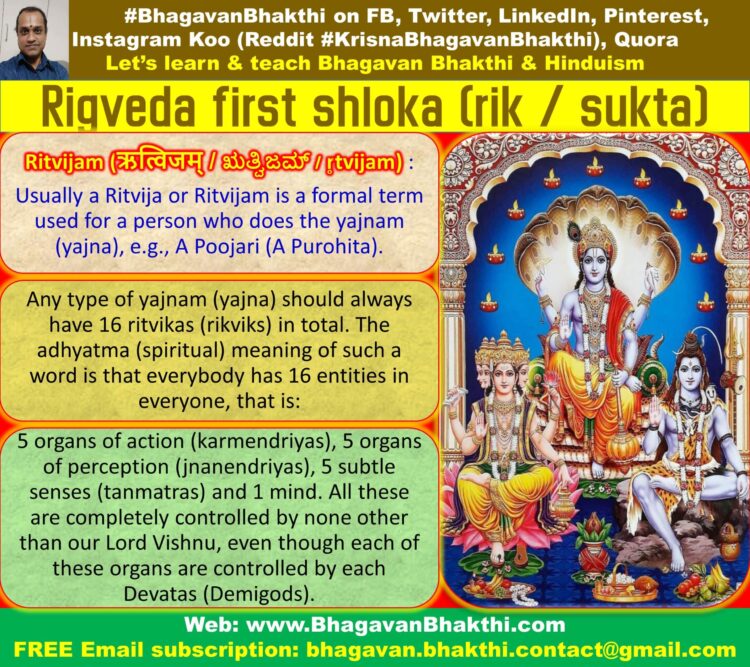
Any type of yajnam (yajna) should always have 16 ritvikas (rikviks) in total.
The adhyatma (spiritual) meaning of such a word is that everybody has 16 entities in everyone, that is:
5 organs of action (karmendriyas), 5 organs of perception (jnanendriyas), 5 subtle senses (tanmatras) and 1 mind.
All these are completely controlled by none other than our Lord Vishnu, even though each of these organs are controlled by each Devatas (Demigods).
To know more information about Devatas (Demigods) or tatvabhimani Devatas who control our body parts, please click the below link:
List of Devatas controlling human body parts
4. Hotaram (होतारं / ಹೋತಾರಂ / hōtāraṁ) :
Hotaram almost has the same meaning as Ritvik (See above Ritvijam). He is someone who offers sacrifices in yajna / agni (fire).
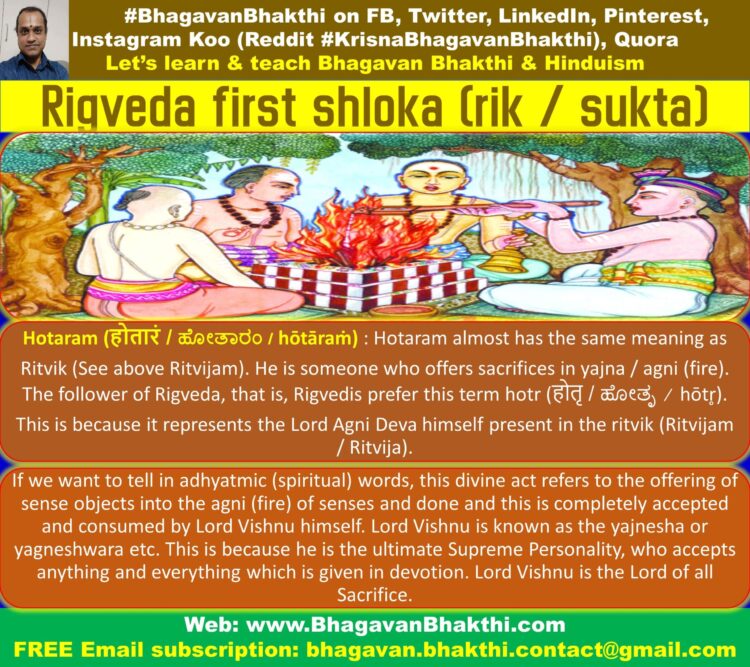
The follower of Rigveda, that is, Rigvedis prefer this term hotr (होतृ / ಹೋತೃ / hōtr̥).
This is because it represents the Lord Agni Deva himself present in the ritvik (Ritvijam / Ritvija).
If we want to tell in adhyatmic (spiritual) words, this divine act refers to the offering of sense objects into the agni (fire) of senses and done.
And this is completely accepted and consumed by Lord Vishnu himself.
Lord Vishnu is known as the yajnesha or yagneshwara etc.
This is because he is the ultimate Supreme Personality, who accepts anything and everything which is given in devotion.
Lord Vishnu is the Lord of all Sacrifice.
5. Ratnadhathamam (रत्नधातमम् / ರತ್ನಧಾತಮಮ್ / ratnadhātamam) :
The Sanskrit word ‘Ratna’ is a synonym term for wealth.
Lord Agni Deva (Depending of Lord Vishnu) gives wealth (prosperity) to the doer of yajna.
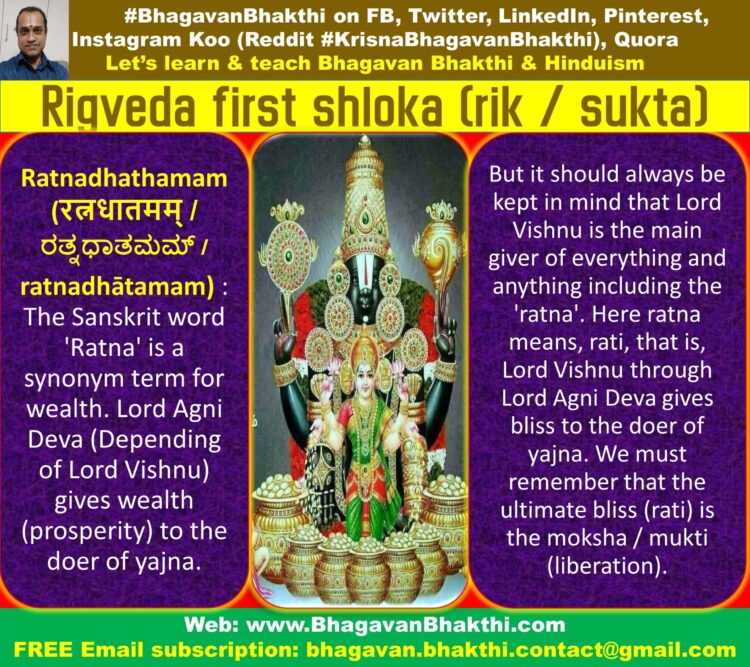
But it should always be kept in mind that Lord Vishnu is the main giver of everything and anything including the ‘ratna’.
Here ratna means, rati, that is, Lord Vishnu through Lord Agni Deva gives bliss to the doer of yajna.
We must remember that the ultimate bliss (rati) is the moksha / mukti (liberation).
Thus, it is very much clear that, all the qualities eulogized by the attributes in this first shloka (rik) are found in enormous quantity in Lord Vishnu.
Sometimes when certain meanings are considered, such attribute is present only in Lord Vishnu and no one else will be possessing that (those) quality (qualities).
Thus all the shlokas (sukta or rik) of the divine Rigveda is very much Lord Vishnu oriented first and foremost including the above first shloka (sukta or rik).
Now, let us know the following:
Who is Lord Agni Deva?
1. Meaning of Agni : Agni means, he is someone who is worshiped first and most.
(But the grand first, that is, प्रपितामह / ಪ್ರಪಿತಾಮಹ / prapitāmaha – The ‘aadi beeja’ or ‘aadi deva’ is Lord Vishnu. Lord Agni Deva is completely dependent on Lord Vishnu).
|| अग्रे नियते इति अग्निः – अग्र एव अभिपूज्यताम् || ಅಗ್ರೇ ನಿಯತೇ ಇತಿ ಅಗ್ನಿಃ – ಅಗ್ರ ಏವ ಅಭಿಪೂಜ್ಯತಾಮ್ || agrē niyatē iti agniḥ – agra ēva abhipūjyatām ||
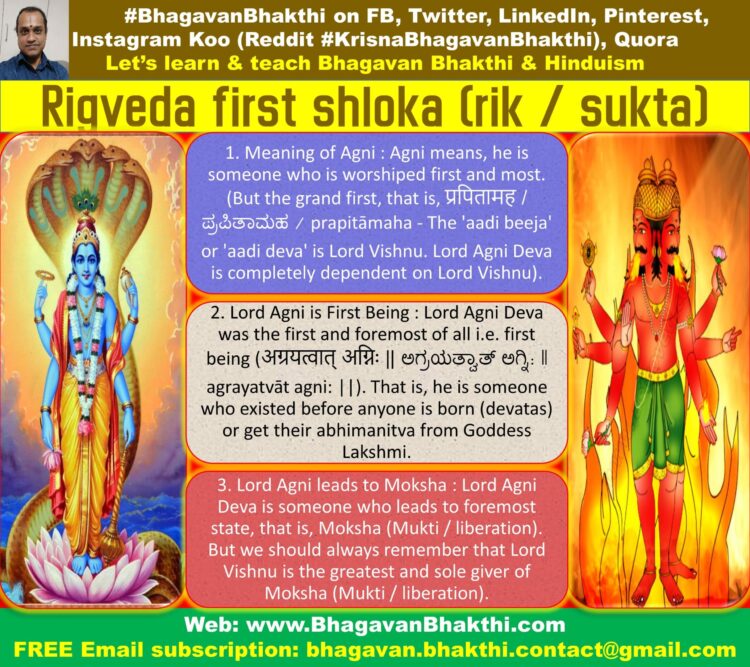
2. Lord Agni is First Being : Lord Agni Deva was the first and foremost of all i.e. first being (अग्रयत्वात् अग्निः || ಅಗ್ರಯತ್ವಾತ್ ಅಗ್ನಿ: || agrayatvāt agni: ||).
That is, he is someone who existed before anyone is born (devatas) or get their abhimanitva from Goddess Lakshmi.
3. Lord Agni leads to Moksha : Lord Agni Deva is someone who leads to foremost state, that is, Moksha (Mukti / liberation).
But we should always remember that Lord Vishnu is the greatest and sole giver of Moksha (Mukti / liberation).
अग्रे नयति इति अग्निः || ಅಗ್ರೇ ನಯತಿ ಇತಿ ಅಗ್ನಿ: || agrē nayati iti agni: ||
4. Lord Agni devourer of all beings : Lord Agni Deva is someone, who is the devourer of all beings (living and nonliving beings), that is, devours all at the time of destruction.
But the real and original devourer is Lord Vishnu. Lord Agni Deva always listens to the instructions of Lord Vishnu.
अत्ति इति अग्निः अदनात् अग्निः || ಅತ್ತಿ ಇತಿ ಅಗ್ನಿಃ ಅದನಾತ್ ಅಗ್ನಿಃ || atti iti agniḥ adanāt agniḥ ||
5. Lord Agni activator of body and it’s parts : Lord Agni deva is someone who is the activator of all the bodies and its parts.
अंगनेतृत्वात् अग्निः || ಅಂಗನೇತೃತ್ವಾತ್ ಅಗ್ನಿಃ || aṅganētr̥tvāt agniḥ ||
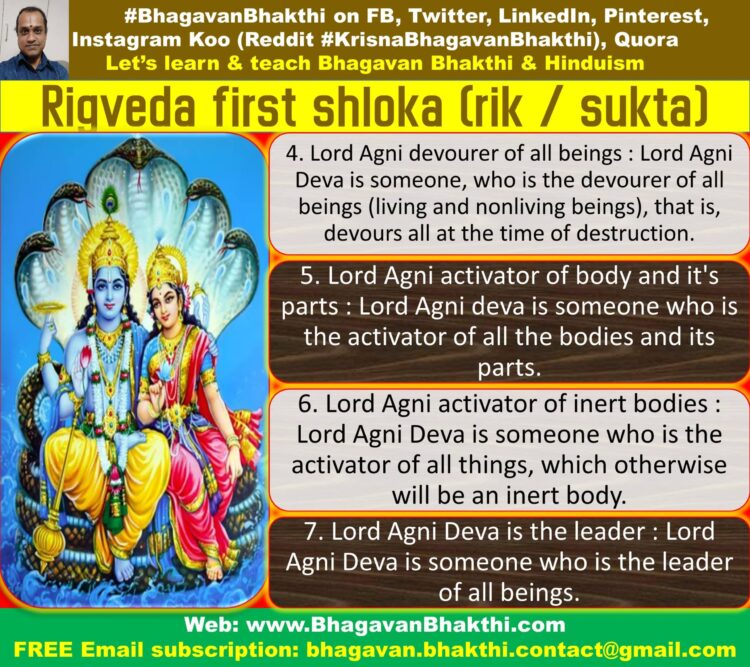
6. Lord Agni activator of inert bodies : Lord Agni Deva is someone who is the activator of all things, which otherwise will be an inert body.
अगं नयति इति अग्निः || ಅಗಂ ನಯತಿ ಇತಿ ಅಗ್ನಿಃ || agaṁ nayati iti agniḥ ||
7. Lord Agni Deva is the leader : Lord Agni Deva is someone who is the leader of all beings.
अग्रणीत्वात् अग्निः || ಅಗ್ರಣೀತ್ವಾತ್ ಅಗ್ನಿಃ || agraṇītvāt agniḥ ||
अग्रणी ग्रामणी श्रीमान… इति श्री विष्णुसहस्रनामे || ಅಗ್ರಣೀ ಗ್ರಾಮಣಿ ಶ್ರೀಮಾನ್… ಇತಿ ಶ್ರೀ ವಿಷ್ಣುಸಹಸ್ರನಾಮೇ || agraṇī grāmaṇi śrīmān… iti śrī viṣṇusahasranāmē ||
But the original ‘Leader’ is Lord Vishnu.
PS : Here also all the qualities and characteristics expounded by the word ‘Agni’ are present in great abundance in Lord Vishnu and sometimes only in Lord Vishnu.
Thus it should always be remembered that ‘Agni’ in no doubt is primarily the name of Lord Vishnu.
Lord Vishnu is the doer of anything and everything.
Hinduism speaks about monotheism and not polytheism.
Lord Vishnu is the only Ishwar (God) in Hinduism and all others are his followers starting from Goddess Lakshmi,
Lord Brahma, Goddess Sarasvati, Lord Shiva, Goddess Parvati, Lord Indra, Lord Surya, Lord Chandra etc. etc. etc.
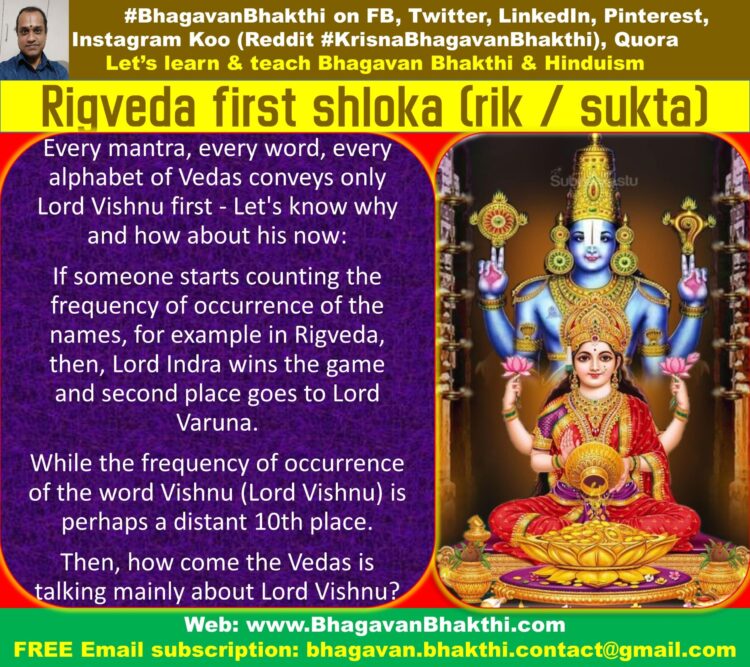
Every mantra, every word, every alphabet of Vedas conveys only Lord Vishnu first – Let’s know why and how about his now:
If someone starts counting the frequency of occurrence of the names, for example in Rigveda, then, Lord Indra wins the game and second place goes to Lord Varuna.
While the frequency of occurrence of the word Vishnu (Lord Vishnu) is perhaps a distant 10th place.
Then, how come the Vedas is talking mainly about Lord Vishnu?
Let’s know the inside meaning of this now…
There is nothing like a magic wand present in Vedas and no one is trying to do maya (illusion) here. Also, there is nothing like contrived logic used here.
Let us understand this by straight facts as per the great Vaishnava Saint Sri Madhvacharya Ji.
Sri Madhvacharya Ji has very much clarified the purport of every mantra, every word and every alphabet of all the Vedas is Lord Vishnu himself with ample examples and illustrations.
Few of those great examples with samples from the Great Vedas themselves are provided as given below:
The definition of the Vedas does not take statements or pieces of statements separately from its context.
But rather, it is a holistic approach, taking into account the context, proposition, epilogue, event, parables, iterations and logic as a whole.
The latter takes precedence, along with ambiguous and unambiguous statements.
1. Taittiriya Brahmana : Taittiriya Brahmana talking about the “One Lord”, but with different names.
यं इंद्रं आहुर्वरुणं यमाहुयं मित्रमाहुयमु सत्यमाहुः |
ಯಂ ಇಂದ್ರಂ ಅಹುರ್ವರುಣಂ ಯಮಾಹುಯಂ ಮಿತ್ರಮಾಹುಯಮು ಸತ್ಯಮಾಹುಃ |
yaṁ indraṁ ahurvaruṇaṁ yamāhuyaṁ mitramāhuyamu satyamāhuḥ |
(Taittiriya BrAhmaNa 3.7.98)
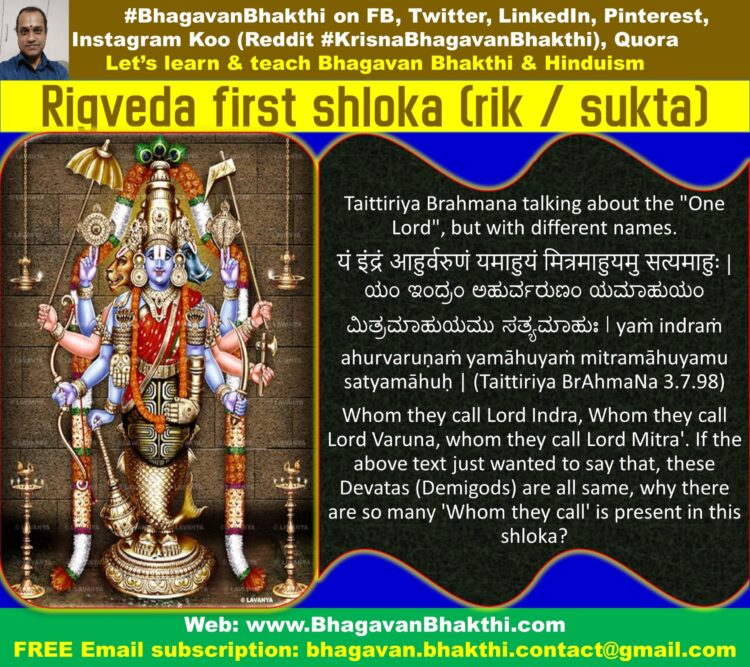
Whom they call Lord Indra, Whom they call Lord Varuna, whom they call Lord Mitra’.
If the above text just wanted to say that, these Devatas (Demigods) are all same, why there are so many ‘Whom they call’ is present in this shloka?
It is purely redundant.
But instead, the repeated usage is to emphasize that, it is the same Supreme Personality who is called by all those names, and not different entity by each name.
Thus that one entity is no one self than Lord Vishnu himself.
2. Rigveda 10th Mandala Vishwakarma Sukta :
Rigveda 10th Mandala Vishwakarma Sukta, unequivocal talks about all names which apply to Lord Vishnu himself.
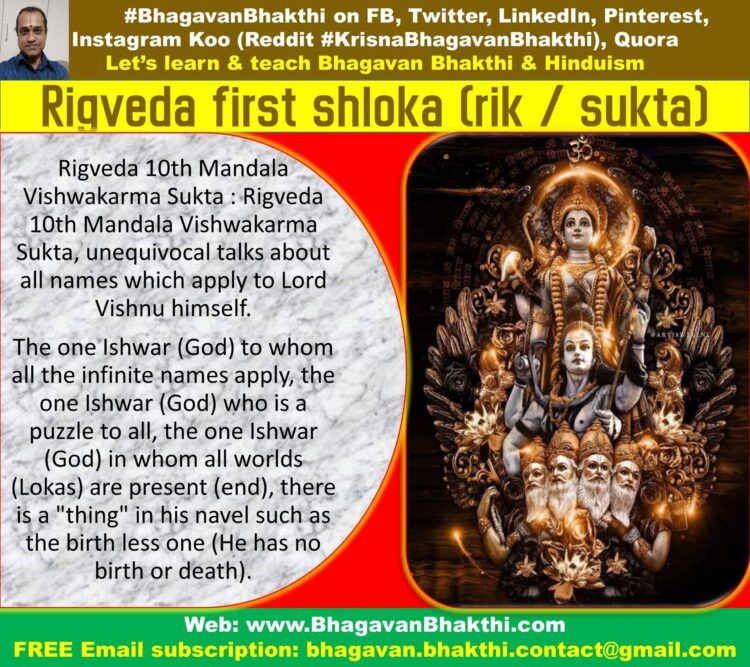
यो न॑: पि॒ता ज॑नि॒ता यो वि॑धा॒ता धामा॑नि॒ वेद॒ भुव॑नानि॒ विश्वा॑ । यो दे॒वानां॑ नाम॒धा एक॑ ए॒व तं स॑म्प्र॒श्नं भुव॑ना यन्त्य॒न्या || 10.82.3 ||
त आय॑जन्त॒ द्रवि॑णं॒ सम॑स्मा॒ ऋष॑य॒: पूर्वे॑ जरि॒तारो॒ न भू॒ना । अ॒सूर्ते॒ सूर्ते॒ रज॑सि निष॒त्ते ये भू॒तानि॑ स॒मकृ॑ण्वन्नि॒मानि॑ || 10.82.4 ||
प॒रो दि॒वा प॒र ए॒ना पृ॑थि॒व्या प॒रो दे॒वेभि॒रसु॑रै॒र्यदस्ति॑ । कं स्वि॒द्गर्भं॑ प्रथ॒मं द॑ध्र॒ आपो॒ यत्र॑ दे॒वाः स॒मप॑श्यन्त॒ विश्वे॑ || 10.82.5 ||
तमिद्गर्भं॑ प्रथ॒मं द॑ध्र॒ आपो॒ यत्र॑ दे॒वाः स॒मग॑च्छन्त॒ विश्वे॑ । अ॒जस्य॒ नाभा॒वध्येक॒मर्पि॑तं॒ यस्मि॒न्विश्वा॑नि॒ भुव॑नानि त॒स्थुः || 10.82.6 ||
(Above is from Rigveda 10.82.3 to 10.82.6)
The one Ishwar (God) to whom all the infinite names apply,
the one Ishwar (God) who is a puzzle to all,
the one Ishwar (God) in whom all worlds (Lokas) are present (end),
there is a “thing” in his navel such as the birth less one (He has no birth or death).
Padma Purana clarifies that, the thing in his navel of this birth less (some one who has no birth or death) one is nothing but the lotus.
Hence, in brief the above statement in 10th mandala of Rigveda tells us clearly that, all names used in Vedas primarily apply to Lord Vishnu himself and secondarily to other Devatas / Demigods.
Even the names like Lakshmi, Brahma, Rudra, Indra, Varuna, Agni etc. all describe only about Lord Vishnu first and then the others.
3. Name of Lord Vishnu : Nevertheless of the Great Vedas specifying different names with different meaning and actions,
but it always proves and refers to certain extraordinary actions and qualities when dealing explicitly with the name of Lord Vishnu.
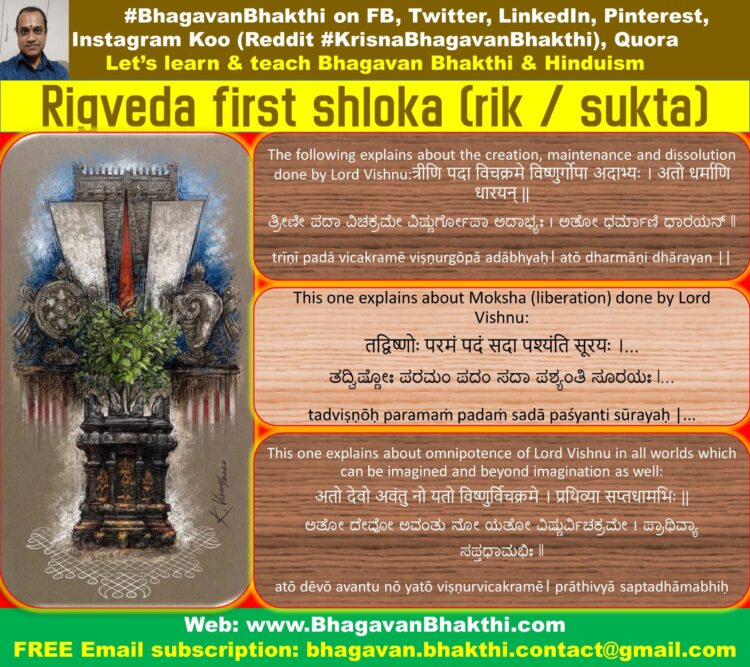
For example : The following explains about the creation, maintenance and dissolution done by Lord Vishnu:
त्रीणि पदा विचक्रमे विष्णुर्गोपा अदाभ्यः । अतो धर्माणि धारयन् ||
ತ್ರೀಣೀ ಪದಾ ವಿಚಕ್ರಮೇ ವಿಷ್ಣುರ್ಗೋಪಾ ಅದಾಭ್ಯಃ । ಅತೋ ಧರ್ಮಾಣಿ ಧಾರಯನ್ ||
trīṇī padā vicakramē viṣṇurgōpā adābhyaḥ। atō dharmāṇi dhārayan ||
This one explains about Moksha (liberation) done by Lord Vishnu:
तद्विष्णोः परमं पदं सदा पश्यंति सूरयः ।…
ತದ್ವಿಷ್ಣೋಃ ಪರಮಂ ಪದಂ ಸದಾ ಪಶ್ಯಂತಿ ಸೂರಯಃ |…
tadviṣṇōḥ paramaṁ padaṁ sadā paśyanti sūrayaḥ |…
This one explains about omnipotence of Lord Vishnu in all worlds which can be imagined and beyond imagination as well:
अतो देवो अवंतु नो यतो विष्णुर्विचक्रमे । प्रथिव्या सप्तधामभिः ||
ಅತೋ ದೇವೋ ಅವಂತು ನೋ ಯತೋ ವಿಷ್ಣುರ್ವಿಚಕ್ರಮೇ । ಪ್ರಾಥಿವ್ಯಾ ಸಪ್ತಧಾಮಭಿಃ ||
atō dēvō avantu nō yatō viṣṇurvicakramē। prāthivyā saptadhāmabhiḥ ||
4. Bhallaveya Shruti : Bhallaveya Shruti is making direct connection of all names in one shot:
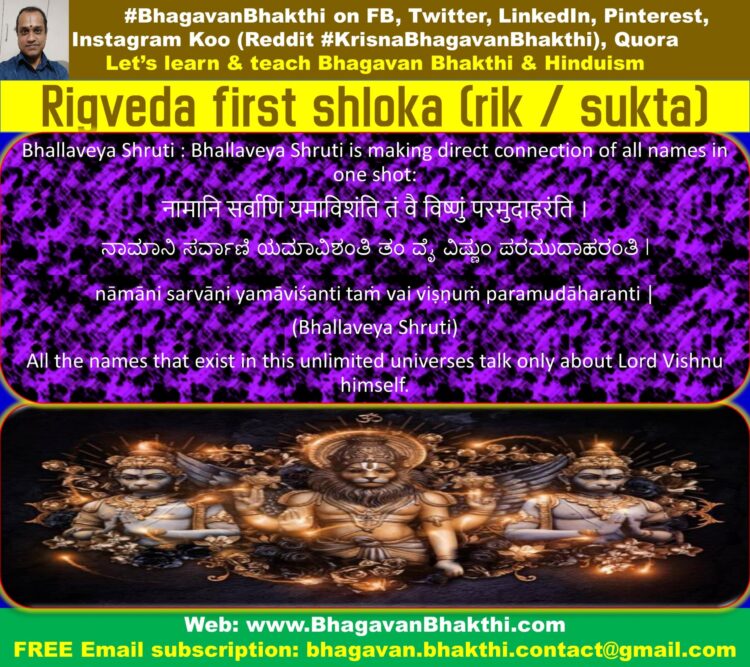
नामानि सर्वाणि यमाविशंति तं वै विष्णुं परमुदाहरंति ।
ನಾಮಾನಿ ಸರ್ವಾಣಿ ಯಮಾವಿಶಂತಿ ತಂ ವೈ ವಿಷ್ಣುಂ ಪರಮುದಾಹರಂತಿ |
nāmāni sarvāṇi yamāviśanti taṁ vai viṣṇuṁ paramudāharanti |
(Bhallaveya Shruti)
All the names that exist in this unlimited universes talk only about Lord Vishnu himself.
5. Aitareya Upanishad : The divine ‘Aitareya Upanishad’ hints about that one Supreme Personality,
whose names contain ष / ಷ / ṣa and ण / ಣ / ṇa pervades everywhere by being indweller of all and is the strength.
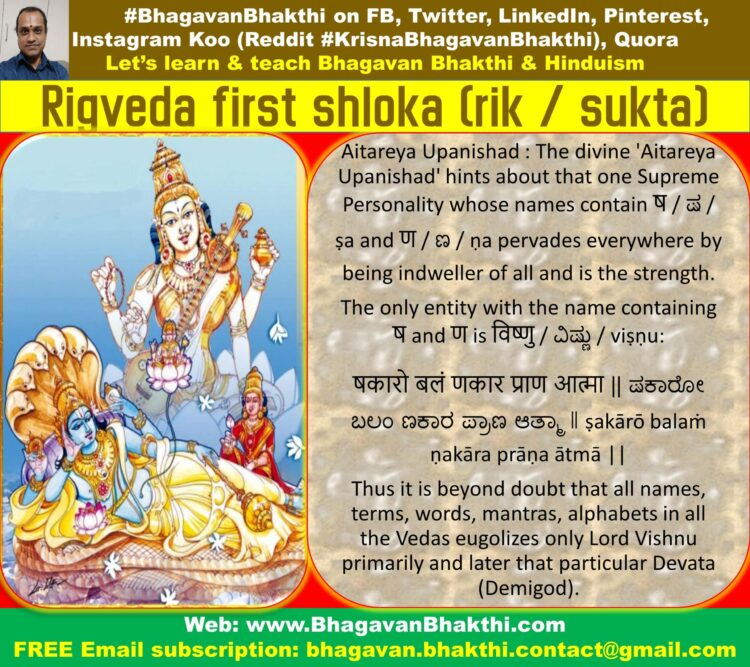
The only entity with the name containing ष and ण is विष्णु / ವಿಷ್ಣು / viṣṇu:
षकारो बलं णकार प्राण आत्मा || ಷಕಾರೋ ಬಲಂ ಣಕಾರ ಪ್ರಾಣ ಆತ್ಮಾ || ṣakārō balaṁ ṇakāra prāṇa ātmā ||
Thus it is beyond doubt that all names, terms, words, mantras, alphabets in all the Vedas eulogizes only Lord Vishnu primarily and later that particular Devata (Demigod).
Hence Sri Madhvacharya Ji declares without any second thought in his Brahmasutra Bhashya like given below:
ब्रह्मशब्दश्च विष्णावेव || ಬ್ರಹ್ಮಶಬ್ದಶ್ಚ ವಿಷ್ಣಾವೇವ || brahmaśabdaśca viṣṇāvēva ||
The name Brahman (Brahma) itself is Lord Vishnu name and Lord Vishnu he himself is the Brahman (Brahma).
Brahman (Brahma) is not someone who is chosen randomly, someone who is shapeless (nirguna), someone who is indescribable blob, but Lord Vishnu himself.
Thus all the mantras, terms, words, names, alphabets in the Great Vedas describe mainly Lord Vishnu himself.
Now, to know about hierarchy in Hinduism, we must know what is the difference between Bhagavan and Devatas / Demigods.
Bhagavan is different and Devatas are different. Bhagavan is one, but Devatas are many.
All are completely dependent on Bhagavan including Devatas.
Many people around the world think all Hindu Gods are same.
Many say that in Hindu Dharma there are koti koti Gods (Crores of Gods).
Many think that Sri Hari is same as Sri Rudra Deva. Many think that Sri Shiva is nothing but Sri Vishnu.
Many have written that Sri Rudra Deva is same as Sri Hanuman, means Sri Hanuman is an avatar of Sri Shiva (Sri Rudra Deva).
Many think that since Sri Shiva has got the name Sri Mahadeva, he is the ultimate.
But people don’t understand the real meaning of this name Sri Mahadeva.
Here Sri Mahadeva means the Demigods (Devatas) who is greatest among the other demigods.
Means Mahadeva is greatest among the demigods who are equal to Sri Indra Deva and who are below to Sri Indra Deva.
But at the same we must also be aware that svayam Sri Rudra Deva or Sri Brahma Deva are great Vaishnavas.
They themselves accept that they are a great bhakta of Sri Rama / Sri Hari / Sri Krishna.
In Sri Vishnusahasranaama, Sri Rudra Deva says:
“sri raama raama raameti, rame raame manorame, sahasra naama tat-tulyam raama naama varaanane“.
This means, if anybody chants one name of Sri Raama is equal to thousand names of Sri Vishnu as given in the Sri Vishnusahasranaama.
This is the power of Sri Raama / Sri Vishnu.
If we chant just any one names of Sri Hari, we will get the real moksha / mukti.
But to enter such stage we need to have a “nirmala”, “nishkaama” bhakti towards Sri Hari.
Also many might not be aware that Sri Rudra Deva had taken avatar in Dvapara Yuga as “Sri Ashvathamacharya Ji” (son of Guru Sri Dronachaarya Ji – Ashwathama) and he was a great devotee of Sri Krishna in the Mahabharata period.
Only Sri Hari is the “antaryami” in everybody. He is everywhere. Can we see a place, where Sri Hari is not present.
In “Naarasimha puraana” Sri Prahlada Maharaja says, “Sri Hari is present is my every anu/cell”.
What more proof we need to have to know that Sri Hari is the only Bhagavan / Ishvara / Parameshvara.
Many people think that Sri Durga Devi is the supreme. Many people think that Sri Kaali Devi is the supreme.
Moreover, many people think that Sri Ganesha, Sri Kartikeya, Sri Surya Deva, etc. are the greatest.
Also many say some belong to Shaiva, some belong to Shakti, some belong to something else.
If Sri Shiva himself is a great Vaishnava, if Sri Mahalakshmi Devi, Sri Sarasvati Devi and Sri Parvati Devi they themselves are great Vaishnava, then how come there are so many different beliefs.
We should remember all these are man-made.
Man is always wanted to be greedy, want to be powerful, he wants everything under the Sun.
Thus man has made so many varieties of beliefs.
If all are greatest, then who is the real greatest?
Who is the supreme Bhagavan? Who is the real Bhagavan? Who is the real Sri Mahadeva? Who is the real Sri Aadi Deva?
Let us understand this as below:
When nothing was there Sri Hari / Sri Vishnu was there. He is the ultimate. He is the supreme.
He is the greatest. He is the real Bhagavan and all others are his followers (Devatas) and only Sri Hari is the Bhagavan.
Yes, Sri Brahma Deva has the great capability of creating the universe. But without Sri Hari’s help, even Sri Brahma Deva is nothing.
Sri Hari who is called the antaryami, sits inside Sri Brahma Deva and does all the creation.
Yes, Sri Rudra Deva has the great capability of destroying anything and everything at the end of the Kalpa (Remember in our Sanatana Dharma, after every end, we have a fresh new start also.
Means, after that particular Kalpa, again another new and fresh Kalpa will get started) but who does this.
Sri Hari who is the antaryami, sits inside the Sri Rudra and does all the destruction.
Yes, Sri Durga Devi has the great capability of multiple things. But who does this?
Sri Hari who is the antaryaami sits inside Sri Durga Devi and does everything as per the requirement.
Similarly the varsha (rain) is brought down to earth through Sri Indra Deva, but not alone, instead with the help of the antaryami Sri Hari.
Vayu (air) is there due to Sri Vaayu Deva, but Sri Hari is the antaryami of Sri Vaayu Deva.
Sri Varuna Deva (ocean God) is there, but Sri Hari is the antaryami of Sri Varuna Deva.
Sri Agni Deva is there, but Sri Hari is the antaryami is Sri Agni Deva.
Similarly according to Bharatiya Sanatana Dharma there are various, various number of Demigods (Devatas).
But all are only followers of Sri Krishna / Sri Raama (other names of Sri Hari).
Anything and everything is completely dependent on Sri Hari.
Because:
He is the Sri Parabrahma. He is the Sri Paramatma. He is the Sri Paramamoola. He is the Sri Bhagavan.
He is the Aadi moola. He is the Aadi Deva. He is the Aadi Beeja. He is the real Sri Mahadeva.
He is the real Sri Parameshvara. He is there everywhere. He is inside everything.
He is not the Sri Mahalakshmi Devi, He is not the Sri Brahma Deva, he is not Sri Mukhyapraana Deva (next Sri Brahma Deva), He is not the Sri Sarasvati Devi,
He is not the Sri Bharati Devi (next Sri Sarasvati Devi), he is not the Sri Rudra Deva, he is not the Sri Tulasi Devi, he is not the Sri Parvati Devi,
He is not the Sri Indra Deva, he is not the Sri Surya Deva, he is not the Sri Agni Deva, he is not the Sri Ganesha, he is not the Sri Kartikeya, he is not the Sri Ashwini Kumaras, he is not any Devatas.
But he is present as Sri Antaryami in everything and everywhere.
Now let us all understand the real hierarchy of the Bharatiya Sanatana Dharma’s Bhagavan and about other Devatas (Demigod).
List of the hierarchy of Hindu Gods are as given below:
1. Sri Hari / Sri Vishnu / Sri Krishna / Sri Rama (Parabrahma, Aadi beeja / Aadi moola / Aadi deva / Bhagavan / Paramatma / Parameshvara etc.)
2. Sri Mahalakshmi Devi
3. Sri Brahma Deva / Sri Mukhyapraana Deva (Both are at the same level)
4. Sri Sarasvati Devi / Sri Bharati Devi (Both are at the same level)
5. Sri Rudra Deva / Sri Shesha Deva / Sri Garuda Deva (All three are at the same level)
6. Shanmahishis – Lord Krishna 6 wives (Other then Rukmini Devi and Satyabhama Devi) [(Jambavati – She is Sri Tulasi Devi, Nila, Bhadra, Mitravinda, Kalindi and Lakshana]
7. Souparni Devi, Varuni Devi, Parvati Devi
8. Indra Deva, Kama Deva
9. Ahankarika Prana
10. Aniruddha, Shachi, Rati, Svayambhuva Manu, Brihaspati, Daksha Prajapati
11. Pravaha Vayu
12. Surya Deva, Chandra Deva, Yama Deva, Shatarupa
13. Varuna Deva
14. Narada Maharishi
15. Bhrigu Maharishi, Agni Deva, Prasuti
16. Vishvamitra, Marichi, Atri, Angirasa, Pulastya, Pulaha, Kratu, Vashishtha, Vaivasvata Manu
17. Mitra, Tara, Nirruti, Pravahi
18. Vishvaksena, Ashwini Devatas, Ganapati, Kubera, 7 Vasus, 10 Rudras, 6 Adityas, 47 Maruts, 10 Vishvedevatas, 1 Rubhu, 2 Dyavaprithivi, 3 Pitrus
19. Karmaja Devatas (Sanatkumaras, 7 Indras, Grahas, Gandharvas, Manus, Apsaras, etc.)
20. Ganga, Parjanya, Sanjna, Rohini, Shyamala, Virat
21. Anakhyata Devatas
22. Svaha Devi
23. Budha (planet)
24. Usha (wife of Ashvini Devatas)
25. Shani Deva
26. Pushkara
27. Ajanaja Devatas (16,100 wives of Lord Krishna)
28. Chira Pitrus
29. Deva Gandharvas
30. Manushya Gandharvas
31. Antardarshi Kings
32. Uttama Manushyas
After this the manushyas who live on this earth come. With us also there is huge amount of hierarchy.
I am not worried about who is the real Bhagavan / Ishvara. But can anybody give me one such example that Sri Hari is not Bhagavan / Ishvara.
Or any other Devata(s) are the real Parabrahma? If you have one / many answers, please let me know.
More information will be added to this on regular, please visit after some time to know more information.
To watch videos on #Hinduism #Sanskrit language, SUBSCRIBE to my YouTube channel from this below link:
#BhagavanBhakthi YouTube channel
To know more about “Hinduism (Sanatana Dharma) information, facts, details, significance, importance, etc.“, kindly click the below link:
Hinduism (Sanatana Dharma) information, facts, details, significance, importance, etc.
To watch the YouTube video of “Hierarchy (Taratamya) of Hindu Gods“, please click the below YouTube video link:
Dear friends, if you need any clarifications about this post, kindly let me know, I will definitely try to answer all of them.
Also your one LIKE, one COMMENT, One Share, one SUBSCRIPTION is highly important.
This will help to know the quality of this content and also it will be helpful to know if any improvements is required for the content.
If you feel this content is useful to you and has helped you to improve your knowledge, kindly share this with your well-wishers.
Because “SHARING MEANS CARING”.
For receive FREE EMAIL SUBSCRIPTION about #BhagavanBhakthi, you can send an email to [email protected] from your email ID.
NAMASTE!
Sri Gurubhyo namaha
Sri Krishnaaya namaha
Sri Krishnaarpanamastu
Shri Datta Prabhu Mantra श्री दत्त प्रभु मंत्र.
Sai Baba Mantra साईं बाबा मंत्र.
Shri Swami Samarth Mantra श्री स्वामी समर्थ मंत्र.
Shiv Mantra महामृत्युंजय मंत्र | शिव तांडव स्तोत्र.
@Shrimad Bhagwat Devi Puran, Third Skand, Page No. 123 —- Lord shri krishna ji said that we Brahma, Shiva & I are in birth and death. We are not immortal.
Thanks for your reply. There are many many grantas available nowadays (I am talking about since 3k years). Everyone have written there own commentary as per their wish and will. But we need to refer to the original grantas as given by Sri Hari / Sri Veda Vyasa Ji, because only valid grantas gives the correct and right information. Dhanyavaad.
⭐ ???? ??????? ?? ?? ??? ??????? ???. ??? ???? ??????? ?? ?? ???? ?? ????? ?? ????? ??? ?????. ????????? ?? ???? ???? & ?????
(?) ???? ??????-?, ?????-?
(?) ???? ??????-?, ?????-??
(?) ???? ??????-??, ?????-?
(?) ??????? ??????? ???? ?????, ?????-?, ??????-?, ???? ??-??? —- ???? ???? ??????? ?? ???? ???? ?? ??????, ????? & ? ??? ?? ????? ??? ?????. ?? ??? ??? ????????.
??? ???? ??????-?, ?????-?, ??? ????, "??? & ? ???? ??? ???? ??????." ??? ???? ??????? ?? ?? ??? ??????? ???. ???? ??????? ?? ?? ???? ?? ????? ?? ????? ??? ?????. ?? ??? ??? ???????? ??? ???????? ???? ????? ?? ????? ??? ?????
⭐ ????? ?? ??? ????? ??? ??? ?? ????? ???????? ??? ??????? ???. ????? ??? ??????? ????? ?? ???? ???? ???? ????? ???? ?????????
(?) ???? ??????-?, ?????-??
(?) ???? ??????-?, ?????-??,??
(?) ???? ??????-??, ?????-?
(?) ???? ??????-??, ?????-??
(?) ???? ??????-??, ?????-?? & ??
??? ???? ??????-??, ?????-??, ??? ???? ??????? ?? ????, "?? ??????! ??? ?? ????? ???????, ?? ?? ??? ?????? ?? ???? ???? ??????? ???. ?? ??? ????? ?? ??????? ??? ????, ??? ???? ?????? ??? ??????? ????? ??? ??? ?????????????? (???????????) ????? ?.?. ????? ????? ?? ?? ????? & ?????."
⭐???? ??????-?, ?????-??
??? ???? ?????, ??? ???? ??????? ?? ?????? ????? ?? ???? ? ?????????? ???? ??? ????? ???? ??????? ??? & ??? ???????? ?????????? ?????? ?? ???? ??????? ??? ????????? ?? ???? ??????-??, ?????-?? & ??
?? ??? ??????????? ?? ????????? & ???? ?????. ??? ??? ???? ???????? ??????? ?? ?? ???????? ?????? +91 7496801825
Please check the evidences carefully only then reply
Again thanks for your long feedback.
In every grantas, Sri Hari / Sri Krishna has been the only "sarvottama bhagavan". Sri Krishna himself has given the right to everybody to keep once belief and you are doing the same. All "mayavaadi" always have been telling as per there wishes and off course as said you have every right to keep your own opinion.
For me and as per the grantas provided by Sri Hari / Sri Veda Vyasa Ji, Sri Hari / Sri Krishna is not only the "Sarvottama Bhagavan", but in fact is the "only Bhagavan" and all others are his followers.
Sri Gurubhyo Namaha
Sri Krishnaaya Namaha
Your articles are always helpful to me. Thank you!